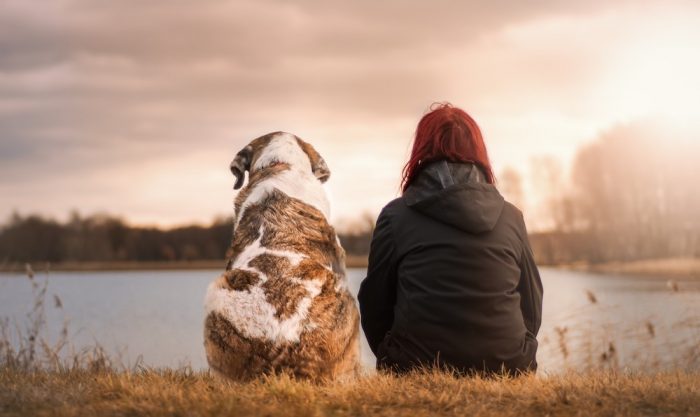With unconditional love, the full capability to forgive and forget, the power to live in the moment, and the ability to fall asleep cuddled up in our laps without a worry in the world, pets represent all that is good in the world.
Pets need one thing for fulfillment in life: their human. There’s no denying this when we walk through the door and are quickly greeted by our best friend, acting as if they haven’t seen us in years.
There’s no common language spoken, but there’s most certainly communication that’s fully understood between pet and owner—communication built in mutual and everlasting love.
Unfortunately, no pet is immortal, and pet owners will inevitably experience the loss of their animal.
Pets define chapters of our lives.
Whether the chapter is growing up through childhood, getting married and having kids, surviving an illness, or surviving a breakup, our pets are right there with us. And when we lose a pet, we lose a piece of ourselves with them.
When a pet passes away, the unconditional love is no longer a part of the everyday, and a huge void forms with deafening silence. Losing a pet and the unconditional love we get from and give to pets will change us forever.
While we’re grieving the loss of a pet, it can feel like we are alone in what we are going through. We had a bond with our pet that is difficult to put into words and often overlooked by others, who try to compare our loss with other life events.
Luckily, with roughly 70 percent of our population today having a pet in their home, our society is making great strides in giving pet lovers permission to grieve, pay tribute, and show their emotions for the loss of these loved pets. After all, love and grief will always be equal.
You have the permission to fully grieve the loss of your beloved pet, no matter what others think, say, or do that may make you think otherwise.
If you or someone you know is grieving a pet, there are many ways you can honor your pet and process the emotions that come and go as you grieve.
Ways to grieve and honor the lives of our pets:
1. Say goodbye.
While saying goodbye is never easy, creating a final memorial ceremony is a great way to get closure on your pet’s life and begin your grieving journey.
To help say goodbye, you can consider hosting a celebration-of-life party. Invite close friends and family over for the burial process, and gather songs and readings to customize the experience.
Every relationship with a pet is different, and saying goodbye will look different for everyone. Allow yourself to personalize the goodbye based on your relationship with your pet. Ask yourself, “How would my pet want me to say goodbye?” and let your intuition plan accordingly.
2. Become aware of the different stages of grief.
Dr. Alan Wolfelt defines “grief” as the simple shorthand we use for what is actually a highly complex mixture of thoughts and feelings. Grief is everything we think and feel inside after someone we love dies or leaves or something we are attached to goes away. Grief is the instinctive human response to loss.
For some, grief can best be explained by looking at it in stages, with the five stages of grief being:
- Denial
- Anger
- Bargaining
- Depression
- Acceptance
Grief can be looked at as a linear or circular process that encompasses the five stages.
For some folks, understanding grief in this linear type of fashion is a great way to frame up the emotional response and journey. For others, grief might not be as prescribed as the stages above and will seem more sporadic when the emotions arise.
Be open to feeling the different stages as the days pass and consider talking about or writing down the emotions as they surface.
3. Be kind and patient with yourself.
The emotions associated with grieving a pet can sneak up on you when you’re least expecting it.
Going for a walk without your dog for the first time, a coworker mentioning something silly their cat did this morning, or just waking up in the morning without your pet there can leave you feeling heavy, empty, and filling up with tears.
It’s probable that you will feel physical weakness following the death of your pet. This is a normal reaction for your body to go through.
Be kind to yourself as you prepare for the new normal of a life without your beloved pet. Just as it took time to build the relationship with your pet, it will take time to get used to him or her not being there.
Instead of pushing through your pain and avoiding whatever you’re feeling, give yourself some time to sit with your emotions.
Take a personal day away from work, treat yourself to comfort food, and feed yourself hope that what you’re feeling right now will get easier with time—because it will.
“’Tis better to have loved and lost than never to have loved at all.” ~ Alfred Lord Tennyson
4. Acknowledge that where you are right now is exactly where you should be.
Sometimes our heads get in the way of our heart’s desire to mourn by trying to justify the depth of our emotions.
Some people want to “rank” their grief, pitting their grief emotions with others who they feel may be “worse” or more worthy of emotions than the death of an animal.
Your grief is your grief, and it deserves the care and attention of anyone who is experiencing a loss. Acknowledge that you’ve lost something very important to you and life will feel different moving forward.
5. Honor the beautiful life you shared with your pet.
The memories you shared with your pet are the pieces that you’ll be able to keep in your heart forever. It’s what will keep the spirit of their life alive forever, never to be forgotten.
Embracing these memories, both happy and sad, can be a slow and, at times, painful process that occurs in small steps.
To help preserve the memories and honor your loved pet, consider:
>> Creating a shared photo album with friends and family
>> Talking about memories you have with your pet with friends and family
>> Writing down your favorite memories with your pet
>> Writing your pet a letter recalling your time together
>> Donating to a local shelter in their honor
>> Planning a ritual of what your pet enjoyed doing
>> Creating a special spot in the garden with a rock or marker with the pet’s paw print engraved on it
>> Planting a tree in their honor
>> Creating a diamond from their ashes
>> Making a scrapbook to capture everything special, beginning to end
>> Creating a photo montage video with special music
6. Adjust your self-identity and “new normal.”
Part of your self-identity might come from being a pet owner. Others may also think of you in relation to your pet. You may be “the woman who always walked the little white dog around the neighborhood” or “the friend whose cat always purred.”
Adjusting to this change is a central need of the grieving process. Take time to think about how your life will be different without your pet.
While animal companions occupy physical space in our life and our home, many times their presence is felt more with our senses.
When that pet is no longer there, the lack of their presence, the silence, can become deafening. It’s the reality of the “presence of the absence.” Merely being aware of this stark reality will assist in preparing one for the flood of emotions.
During this tough time, consider new habits that will help you to adjust to your new normal. For example, try replacing your morning walks with a trip to the gym or yoga studio.
7. Search for meaning.
The relationship shared with a pet is a special and unique bond, a tie that some might find difficult to understand. During this time in a grief journey, many find themselves questioning their own beliefs regarding pets and the afterlife. Friends, family members, acquaintances, and clergy will also have their own opinions.
When a pet dies, it’s natural to question the meaning and purpose of pets in your life. Coming to terms with these questions is another need to meet during your grief journey.
Know that it is the asking, not the finding of concrete answers, that is important.
8. Receive support from others.
During this time, you need the love and support of others. Talking or being with other pet owners who have experienced the death of a pet can be one important way to meet this need.
Find a friend or family member who understands the love shared with an animal. Schedule coffee time with them to share stories and find support.
Life will go on…
The life we share with our pets is special and unique. Their only role while they are with us is to love us. Therefore, when that love is gone, our heart shatters.
Smile because it was real—the unconditional love as well as the heartbreak. It is all part of the grieving process, which helps your own mental health and to honor the pet’s memory.
Give yourself permission to honor that love. And know your life was changed because of that pet, and your heart will never be the same because of your pet’s death.












Read 2 comments and reply